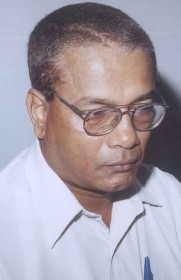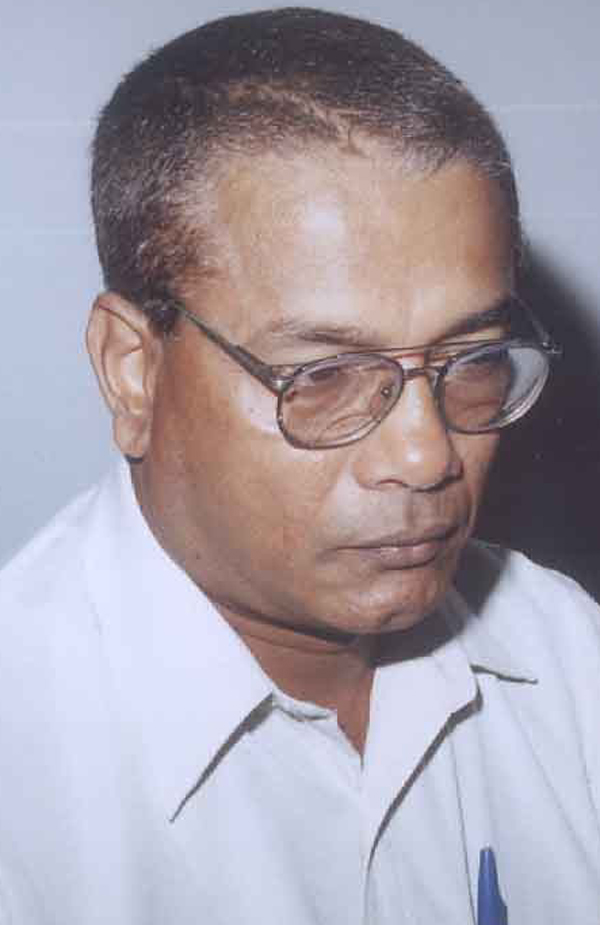-farmers point to flooding, pests
Stakeholders in the local coconut industry were urged to examine their options as they raised their concerns about the sub-sector at a workshop on Tuesday.

The meeting was the first in a series aimed at revitalizing the industry, according to the Ministry of Agriculture. About 20 participants were present as Agriculture Minister, Robert Persaud spoke about government’s intention to reverse the inadequate attention given to the sub-sector. The Minister said that the decline of the local coconut business was due in part to a global decline of the industry, inadequate infrastructure and little work done on research and development, a statement from the Ministry said.
Issues of concern such as diseases, drainage, labour, and technology were raised by participants, who included coconut estate owners, farmers, processors and exporters of coconuts and coconut-based products.
Several years ago Stabroek News had reported on some of the very problems facing the industry and another major one was the age of the coconut trees and the absence of significant replanting.
In Pomeroon, one of the major issues is drainage, said Andron Alphonso. The area is one of the major coconut producing areas in the country. Speaking with Stabroek News on Tuesday, Alphonso- an executive with conglomerate, Afro Alphonso and Sons Enterprises, explained that almost every December, tremendous flooding takes place due to a combination of rainfall and high tides. He asserted that the mouth of the River should be dredged. Dredging of the Pomeroon has been on the agenda for several years.
His company operates a 700 acres coconut estate and he stated that labour shortage is also an issue. He also pointed out that the continuous export of unprocessed coconuts is not good for the industry. Alphonso stated that operators in the sector can work with government to develop value added products and process the raw materials. Additionally, Alphonso said that diseases, particularly ‘coconut caterpillar’ are a problem. He noted that the Ministry had recommended a solution but he said that they have tested it and “it doesn’t work”. More studies need to be done, he added.
Meantime, Permanent Secretary in the Ministry, Dindyal Permaul, noting that they need many things, told the participants to lobby for these. He said that the industry has to begin examining its options as regards technology, economies of scale and looking at different revenue streams. He urged that the farmers look at the business in a smarter way pointing to options such as contract farming. Permaul noted that India had consented to assist with technical help in the industry.
According to the PS, they had solved many of the problems spoken about many years ago but the “resolve to deal with the issue is not there”. The Ministry and farmers should work together, he declared while pointing out that farmers have not begun to tap into the complexities and diversification streams in the industry.
High yields
William Thomas, a farmer from Coverden on the East Bank Demerara spoke of a reluctance to invest because farmers were not getting high yields. He said that drainage has been an issue in the area but noted that the Ministry has a programme in the district at present. The farmer queried whether the Ministry could send personnel to advise on the sector and what other crops they can grow. Farmers need expert advice on how to move forward, he underlined, pointing out that some plants are not healthy.
Other problems that were raised by participants included the yellowing of palms and low-producing coconut species. Several short term activities to tackle the constraints identified were outlined. It was noted that farmers need to mechanize and they would have to organize and re-orient their plantations to do so.
Permaul had advised the formation of a body which would look out for the interest of the industry. Farmers can benefit a lot, if they get themselves organized, he stated. A committee was formed.
Director of the National Agricultural Research Institute (NARI), Dr. Oudho Homenauth, meantime, noted that a nursery will be established, initially at Hope Estate.
In its statement, the Ministry reported Persaud as stating that during the past 14 months, exports of coconuts and coconut-based products had increased 100%. He urged the workshop to develop a practical work programme as the ministry is willing to support various stakeholders. The Minister stated that it is the intention of the government to allocate more resources towards the coconut industry and to link to the wider agricultural diversification thrust.
Guyana is currently pursuing support from India, and several South American countries to assist in this effort especially to get new varieties. The Minister pointed to recent investments in the industry including canned coconut milk and a number of coconut water bottling plants. Also, he said that there is interest in other coconut-based products and this may be the right time for estate owners and farmers to relook at the industry seriously, according to the statement.

